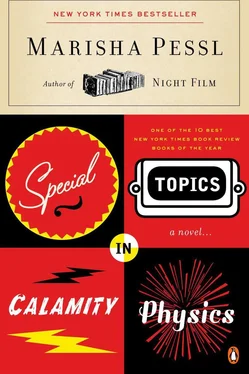“Some people are fragile as — as butterflies and sensitive and it’s your responsibility not to destroy them,” she went on. “Just because you can. ”
She was staring at me again, minute reflections of light dancing in her eyes, and I tried to smile reassuringly, but it was difficult because I could see how drunk she was. Her eyelids sagged like lazy window shades and she was trying too hard to herd her words together so they jostled, bumped, stepped all over each other.
“Grow up in a country,” she said, “a house of — of privilege, endless commodity, you think you’re better than other people. You think you belong to a fucking country club so you can kick people in the face on your way to acquiring more things. ” She was staring at Jade now and said things as if biting it off the end of a candy bar. “It takes years to overturn th — this conditioning. I tried my whole life and I still exploit people. I’m a pig. Show me what a man hates and I’ll show you what he is. Can’t remember who said that…”
Her voice went dead. Her teary eyes drifted toward the center of the table, bobbing around the rose centerpiece. All of us were sort of madly eyeing each other, holding our breaths in mutual queasiness — what people do in restaurants when a soiled drunk person walks in and starts shouting through a mouthful of kernel teeth about working for The Man. It was as if Hannah had sprung a leak and her character, usually so meticulous and contained, was spilling all over the place. I’d never seen her speak or behave in this way, and I doubted the others had either; they stared at her with sickened yet fascinated expressions, as if watching crocodiles mate on the Nature Channel.
Her teeth snagged her bottom lip, there was a little manifestoed frown between her eyebrows. I was deathly afraid she’d go on about needing to go live on a kibbutz or relocating to Vietnam where she’d become a hash-smoking beatnik (“Hanoi Hannah,” we’d have to call her) or else she’d turn on us, chastise us for being like our parents, odious and square. Even more frightening was the possibility she might cry. Her eyes were wet, murky tide-pools where things unseen lived and glowed. I felt there were few things in the world more horrific than the adult weep — not the rogue tear during a long-distance commercial, not the stately sob at a funeral, but the cry on the bathroom floor, in the office cubicle, in the two-car garage with one’s fingers frantically pressing down on one’s eyelids as if there was an ESC key somewhere, a RETURN.
But Hannah didn’t cry. She lifted her head, looking around the dining room with the confused expression of someone who’d just woken up in a bus station with seams and the button of a shirtsleeve imprinted on her forehead. She sniffed.
“Let’s get out of this fucking place,” she said.
For the rest of the week, even a little bit after that, I noticed Smoke Wyannoch Harvey, age 68, was still sort of alive.
Hannah had brought him back to life like Frankenstein his Monster by her deluge of detail, and thus, in all of our heads (even that of the painfully pragmatic Nigel) Smoke didn’t really seem dead, but simply offstage somewhere, kidnapped.
Jade, Leulah, Charles and Milton had been outside on the patio as Smoke lurched to his death (Nigel and I simply told the others we were “amusing ourselves inside,” which technically was the truth). They were plagued by the If Onlys.
“If only I’d been paying attention,” said Lu.
“If only I hadn’t smoked the rest of that joint,” said Milton.
“If only I hadn’t been hitting on Lacey Laurels from Spartanburg who just graduated from Spartan Community College with a major in Fashion Merchandizing,” said Charles.
“Oh, pu-leese, ” said Jade rolling her eyes, turning to stare at the freshmen and sophomores standing in line to buy their two-dollar hot chocolates. They appeared to be afraid of her gaze, as certain diminutive mammals must tremble at the thought of a Golden Eagle.
“ I’m the one who was there. How hard is it to notice some green polyester person floating facedown in a pool? I could have dived in and saved the man, done one of those good deeds that more or less guarantees entry through the Pearly Gates. But no, now I’m going to suffer from Post Traumatic Stress. I mean, it’s a possibility I never get over this. Not for years and years. And when I’m thirty I’ll have to be submitted into some asylum, with the walls all green, and I wander around in an unflattering nightgown with hairy legs because they don’t allow razors in case you feel the urge to tiptoe into the communal bathroom and slit your wrists.”
That Sunday, I was relieved to find Hannah back to her old self, spiriting around the house in a red-and-white floral housedress.
“Blue!” she called cheerfully as Jade and I walked through the front door. “Good to see you! How is everything?”
Hannah neither commented on, nor apologized for, her tipsy behavior at Hyacinth Terrace, which was fine, because I wasn’t so sure she needed to apologize. Dad said certain people’s sanity, in order to maintain a healthy equilibrium, required getting messy once in a while, what he called “going Chekhovian.” Some people, every now and then, simply had to have One Too Many, go drifty voiced and slouch mouthed, swimming willfully around in their own sadness as if it were hot springs. “Once a year, they say Einstein had to blow off steam by getting so inebriated on hefeweizen, he was known to go skinny-dipping at 3:00 A.M. in Carnegie Lake,” Dad said. “And it’s perfectly understandable. You carry the weight of the world on your shoulders, in his case, the unification of all space and time — you can imagine it’d get quite exhausting.”
Smoke Harvey’s death— any death, for that matter — was as perfectly noble a reason as any for words to stagger out of one’s mouth, for eyes to take almost as much time to blink as it takes for an old man with a cane to descend stairs — especially if, afterward, you looked as epically spic and span as Hannah did. She busied herself with Milton setting the table, slipping into the kitchen to remove a shrieking kettle from the stove, swooping back into the dining room and, as she speedily folded the dinner napkins into cute geisha fans, holding a glorious smile up to her face like a glass during a wedding toast.
And yet I must have been overly zealous in my attempt to convince myself Hannah was all Fiddle Dee Dee and La Dee Da, that our dinners would return to the weightlessness of Pre-Cottonwood, Pre-costume-party days. Or maybe it was the other way around. Maybe Hannah was trying too hard to make things chic and upbeat, and it was akin to beautifying one’s cell; no matter what kind of curtains you hung, or rug you placed by your cot, it was still prison.
The Stockton Observer had published the second and final article on Smoke Harvey that day, detailing what we’d already assumed, that his death had been an accident. There’d been “no indication of trauma to the body” and his “blood-alcohol level had been.23, nearly three times the North Carolina legal limit of.08.” It seemed he’d inadvertently fallen into the pool, been too drunk to swim or cry for help and, in less than ten minutes, he’d drowned. Hannah had been so eager to tell us about Smoke at Hyacinth Terrace, and was in such well-adjusted spirits now, I don’t think Nigel thought twice about bringing him up again.
“You know the number of drinks Smoke would’ve had to knock back to get his BAC to that level?” he asked us, tapping the end of his pencil against his chin. “I mean, we’re talking, for a man about what? Two hundred and fifty pounds? Like, ten drinks in an hour.”
Читать дальше












